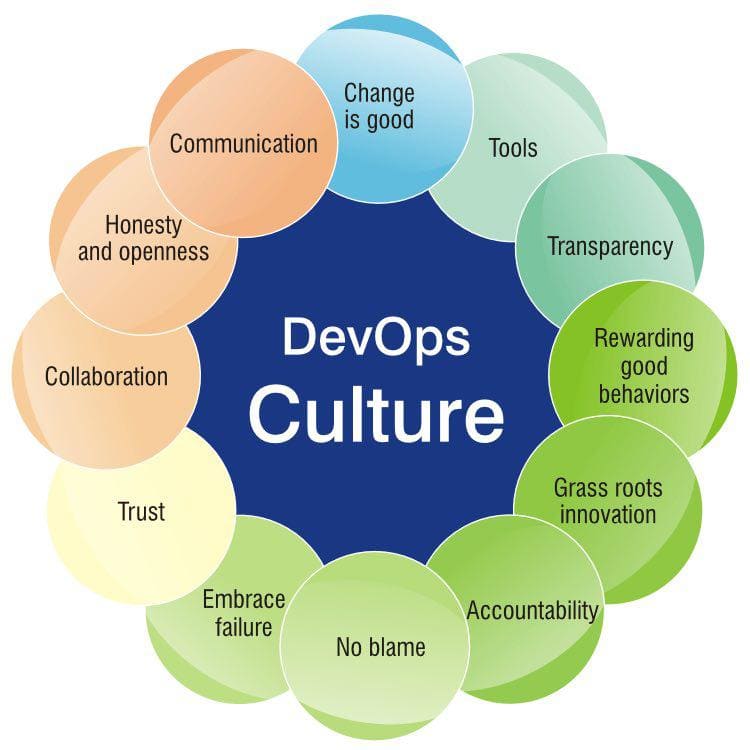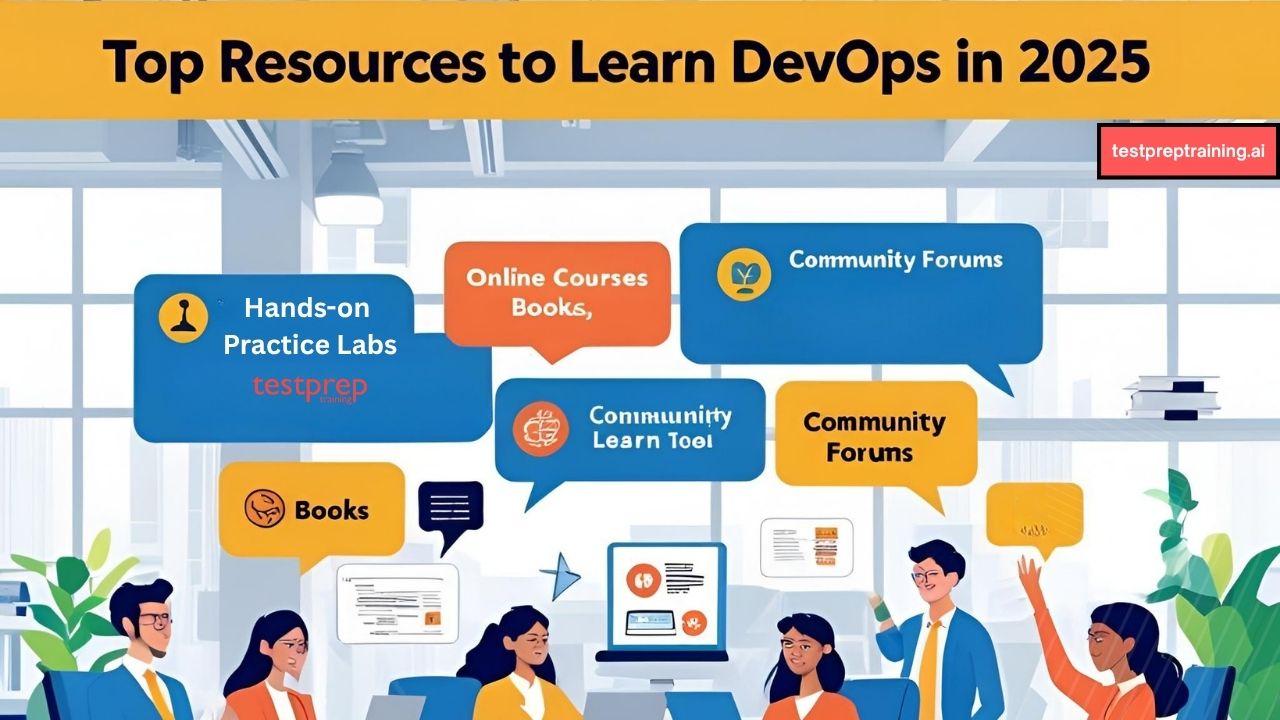If you are curious about DevOps but not sure where to start, you are not alone. DevOps has become one of the most in-demand skill sets in tech, blending development and operations into a faster, smarter way to build and ship software. But with so many tools, terms, and tutorials out there, it can feel overwhelming to know what to learn first or where to learn it. Whether you are just getting into tech, switching careers, or trying to sharpen your skills, this guide will walk you through the best resources to learn DevOps the right way: hands-on, practical, and beginner-friendly.
As DevOps continues to bloom, various interpretations and opinions have surfaced. Institutions embracing DevOps culture are looking into experts, clients, and vendors to help them achieve DevOps. All IT specialists have heard of DevOps by now. And most have heard fairly enough to comprehend. Since DevOps, at its core, provides teams with the tools, workplace culture, and institutional approaches to stimulate the software development lifecycle.
All of this is true, of course, but it also hardly scratches the surface of a very deep and very important topic. DevOps is changing the way we create software. It’s also changing how development and operations teams collaborate and work together. If you’re seeking a promising and valuable career in IT, DevOps can offer you that opportunity, too.
For many IT professionals, however, the initial step on a DevOps journey comprises a basic grasp of its purpose and principles. However, one must know where to begin and how to master DevOps. Therefore, in this article, we are going to discuss all of DevOps and all the best resources one requires to understand DevOps. So, without further due, let’s begin and understand DevOps and all its elements.
Understanding DevOps and Basic Principles
We’ll start with suggestions for the candidate who requires a true ground-floor orientation in what DevOps means and how it generates value. So, first, let’s begin with what DevOps is.
What Is DevOps?
DevOps is the generation of agile software development. Not to mention, it is born from the requirement to keep up with the increased software velocity and throughput agile methods have achieved. Developments in the agile culture and systems in the past decade have shown the need for a comprehensive approach to the entire software delivery process.
DevOps Culture
The very term DevOps is a portmanteau of development and operations. Also, it speaks to its goal of ripping down the walls dividing two groups that (hopefully) administer a common goal. By most accounts, that’s more about changing an association’s culture, collaboration practices, and attitudes than it is about utilising new tools and technology.

DevOps automation and tools
Automating software extension and deployment responsibilities and workflows is a key guider of DevOps success. DevOps is all about substituting the incompetence and errors connected with the manual process, enabling developers and IT communities to focus on innovation and generating value for the company, instead of becoming bogged down in routine maintenance.
DevOps Measurement
Measurement is far more than just another object to check off your DevOps list. It’s a crucial pillar of any successful DevOps journey. Also, it’s difficult to envision succeeding with DevOps without a firm grasp of how and why to monitor the administration, productivity, and results of your software development projects
DevOps Security
Security is just as essential to DevOps as it is to any other passageway to software development. Fortunately, the same DevOps processes that facilitate organisations to produce better software faster also maintain a rigorous, yet effective and flexible, access to application security.
Best resources to Learn DevOps
If you desperately wish to begin with a career in DevOps, then we suggest going through the following list of learning resources to learn DevOps.

Prior Knowledge and Background
The first major concern for adopting a DevOps career in 2020 is your background. Candidates with a former working background in the technology field can have the essential experience and insights for becoming DevOps engineers. Several entry-level roles can pave the way for a DevOps career, such as software developer, systems engineer, and systems administrator.
Even network operations engineers and database administrators can leverage their experience for a DevOps path. However, those starting their DevOps journey fresh after a computer science degree have more to grasp. It’s important to explore various roles within DevOps to better understand the responsibilities of a DevOps professional.
IT training and certification: Worth the investment?
When it befalls to the majority of the domains across IT, industry training and certification programs replace or augment formal education. Microsoft’s MCSE, Cisco’s CCIE, and ISC2’s CISSP certifications all stand out as more or less de facto standards for their respective fields. However, regardless of your formal education, these certifications are often expected to get in the door for many jobs.
DevOps is a moderately new concept, therefore there are dedicated training programs out there already. These include such as the DevOps Training program at the Linux Academy.
- AWS DevOps Engineer – Professional
- Microsoft Azure DevOps Solutions Certification Exam
- Kubernetes Certification
- Docker Certified Associate
- Puppet Professional Certification
- CompTIA Linux+
- Red Hat Certified Specialist in Ansible Automation
Must-read books to upgrade skills to the next level
As many of you know, constant learning is a critical part of DevOps. That’s why we put together this listing. These are various books from a vast array of resources out there, sourced from the Open Source DevOps team. So, here is a list of all the books you must view-
- Firstly, Accelerate, The Science of Lean Software and DevOps: Building and Scaling High Performing Technology Organizations by Nicole Forsgren, Jez Humble, Gene Kim
- Secondly, Ansible: Up and Running, Automating Configuration Management and Deployment the Easy Way by Lorin Hochstein, Rene Moser
- Subsequently, Continuous Delivery: Reliable Software Releases through Build, Test, and Deployment Automation by Jez Humble and David Farley
- Also, DevOps: A Software Architect’s Perspective by Len Bass, Ingo Weber, Liming Zhu
- Not to mention, Effective DevOps: Building a Culture of Collaboration, Affinity, and Tooling at Scale by Jennifer Davis, Ryn Daniels
- Further, Just Culture: Balancing Safety and Accountability by Sidney Dekker
- Moreover, Measure What Matters by John Doerr
- In addition, Practical DevOps by Joakim Verona
- Nonetheless, Site Reliability Engineering by Niall Murphy, Betsy Beyer, Chris Jones, Jennifer Petoff
- Moreover, The Coaching Habit: Say, Less, Ask More & Change the Way You Lead Forever by Michael Bungay Stanier
- Consequently, The DevOps Handbook by Gene Kim, Jez Humble, John Willis, and Patrick, Debois
- Also, Tribal Leadership: Leveraging Natural Groups to Build a Thriving Organization by Dave Logan, John King, & Halee Fischer-Wright
- Lastly, Turn the Ship Around!: A True Story of Turning Followers into Leaders by L. David Marquet
Dedicated DevOps Forums
If everyone in your profession comes with an opinion, a question, or an answer participates in discussions on one platform or another, then you need to join that discussion to learn and establish your position of authority in the industry. No matter how strange it may seem, there is much truth to this annual statement.
DevOps sets a fast pace in development, operations, and systems automation. Therefore, to stay ahead of the game, check out these forums every DevOps engineer should follow. Not only will they inform you, but also provide you with an opportunity to make a name as an authority in your field. So, here is a list of forums you can enjoy-
- Amazon Web Services
- Rackspace Forums
- Microsoft Azure
- DevOps Linkedin Group
- The DevOps SubReddit
Self-teaching: Trenches or bust?
Definitely this brings us to the roll-up our sleeves, trial-and-error, do-it-yourself approach to DevOps education. Even with formal education and DevOps-specific certifications, it’s difficult to argue with the value of just getting into the trenches and computation it out for yourself. Not to mention, that bootstrap mentality is more or less a hallmark of DevOps. And, it also specify some of the early successes that kicked off the DevOps movement.
Learning Automation
The influence of automation in DevOps roles is very significant. So, one must improve their knowledge and skills in automation for following a career. Not to mention, these professionals are competent in using automation tools for managing servers and deployments. Also, candidates can enhance their marketability by mastering several automation tools and practices. As a result, experts urge learning new things as well as complexities of the automation process for budding DevOps professionals.
Hands-On Practice Is Non-Negotiable
Reading about DevOps is a good start, but real understanding comes from applying what you learn. DevOps is a practice-driven field. The more you build, break, fix, and repeat, the more confident and job-ready you become.
Where to Practice:
- Katacoda: Katacoda offers browser-based, interactive scenarios that let you learn and test tools like Docker, Kubernetes, and GitOps. No setup required.
- Play with Docker & Play with Kubernetes: These sandboxes let you run real Docker and Kubernetes environments in your browser. Perfect for testing commands and small projects.
- AWS/GCP/Azure Free Tiers: Get hands-on experience with real cloud platforms. Create EC2 instances, deploy containers, set up CI/CD pipelines, or use managed Kubernetes services like EKS and GKE.
- Personal Projects: Nothing beats building your own mini project. Try:
- Setting up a blog or app with CI/CD pipelines using Jenkins or GitHub Actions.
- Deploying it with Docker and Kubernetes.
- Writing Terraform code to provision cloud resources.
- Monitoring the app using Prometheus and Grafana.
- Online Labs: KodeKloud and Linux Academy (now part of A Cloud Guru) provide lab-based challenges where you learn by doing, not watching.
By actively working through real problems and building something—even if it’s small—you turn knowledge into lasting skill. Employers value hands-on experience more than certificates or degrees.
Join DevOps Communities and Stay Updated
DevOps isn’t static. Tools evolve, practices shift, and what’s hot today might be outdated in a year. That’s why staying connected to the DevOps community is so important—it keeps you current and helps you grow faster.
Where to Engage:
- Reddit (r/devops): Great for reading others’ experiences, asking tool-specific questions, and staying updated on industry trends.
- Slack & Discord Groups: Search for DevOps-specific communities. Many are full of professionals and learners helping each other with career advice, code review, certifications, and troubleshooting.
- Twitter & LinkedIn: Follow thought leaders like:
- Kelsey Hightower: Talks Kubernetes, cloud, and leadership.
- Liz Rice: Focuses on containers and open-source tooling.
- Viktor Farcic: DevOps author and content creator.
- Podcasts:
- DevOps Cafe: Hosted by industry veterans discussing the future of DevOps.
- The Cloudcast: Covers DevOps, cloud computing, and emerging technologies.
- Screaming in the Cloud: A fun take on cloud and DevOps topics.
- Meetups and Conferences:
- Even virtual events like KubeCon or DevOpsDays offer tons of insights and networking opportunities.
Joining a community means you don’t have to learn everything alone. You get peer support, career guidance, and the occasional insider tip that books and courses won’t teach you.
Reality check
In the early days of computers and technology, the local user group was arguably the best place you could go to get answers and learn about the technology. And that seems to be true to for some extent when it comes to DevOps today. Learning something that evolves rapidly can be challenging. Yet, all learning resources are essential for IT and DevOps. With the era of DevOps in full swing, changes are happening faster than ever. To become a pro in this field, keep updating your skills regularly if you’re determined to master DevOps.

Make your resume stand out and become a Certified DevOps Professional. Try free practice tests here!

